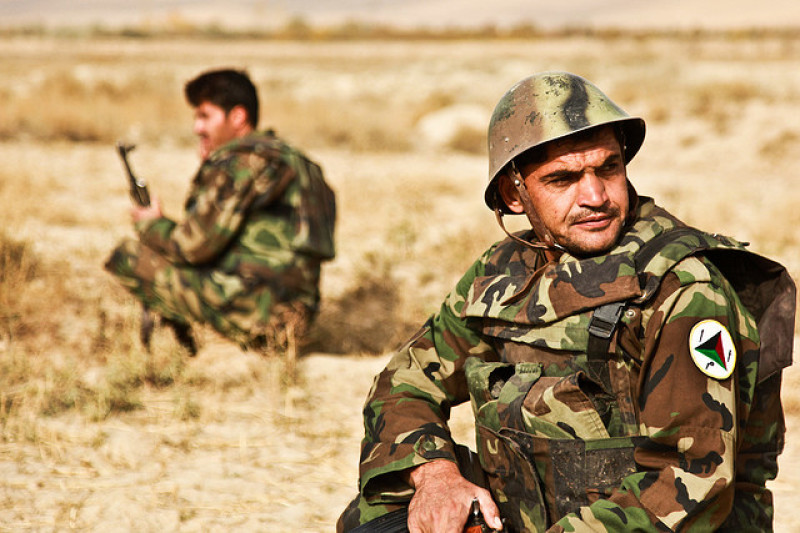

Afghan soldiers keep watch in the village of Dehayat, Afghanistan in this 2009 photo.
After months of intensive effort by Afghan President Ashraf Ghani, the Afghanistan delegation met with Taliban officials in the Pakistani capital of Islamabad on Tuesday. This meeting, mediated by Pakistani officials, is the first official face-to-face discussion that has been acknowledged by the Afghan government after years of attempts to bring the two sides together. This first meeting follows several informal meetings that had taken place this past year and is meant to end more than 13 years of war in Afghanistan where the Taliban have been fighting against the government.
The two sides negotiated ways to brings peace in Afghanistan. Not many details were released, but the government of Afghanistan said in a statement released Wednesday that "it hopes that the negotiations begin a process to avert further bloodshed of innocent Afghans and destruction of the country, and pave the way for reaching durable peace."
It is uncertain as to whether the talks were initiated with support from Taliban leadership. Lawmaker Abdul Qayam told a local TV station, "There're some Taliban who still don't want peace. There're others who want to reconcile."
A representative at Taliban's official political office in Qatar also claims that the Taliban officials at the meeting were not given permission to do so. "We see it as the wrong direction toward peace, and the Pakistani-led process may cause more problems instead of solutions," he wrote in an email exchange with New York Times.
The Afghan government and Taliban has been cautious of having Pakistan mediate past discussions fearing that the Pakistani military would disrupt peace talks to use the Taliban as means to preserve influence in Afghan affairs.
President Ghani's attempt to seek the hand of Pakistani officials to serve as mediators has garnered harsh criticisms and has cost him political capital in Afghanistan. Afghan politicians are suspicious and believe Pakistan's intentions are to interfere and seek authority in Afghanistan.
Despite such wariness, Pakistan's prime minister, Nawaz Sharif considers the talk as a "major breakthrough" in comments recorded for Pakistani TV from the Norwegian capital Oslo. Veteran Pakistani security analyst, Hasan Askari Rizvi, is optimistic about Pakistan's involvement and told the Guardian that "the fact talks are being held in Islamabad will enable [Ghani] to say the Pakistanis are trying to help" during a time when the Afghanistan bureaucracy and parliament are all against Pakistan.
The presence of Islamic State complicates talks of peace as an increasing number of Taliban fighters are jumping ship to join the Islamic State, also known as ISIS. Such defections could persuade Taliban to seek settlement if the leadership sees that fighters continue to defect. On the other hand, this could also lower the chances of possible peace negotiations.
"The question, of course, is whether these Taliban leaders can carry the fighters with them, or whether the leaders immediately lose their followers the moment they talk about peace," said an anonymous Western diplomat, according to New York Times.
The discussion ended with both sides' agreement to continue exchanges after the Muslim holy month of Ramadan.


















